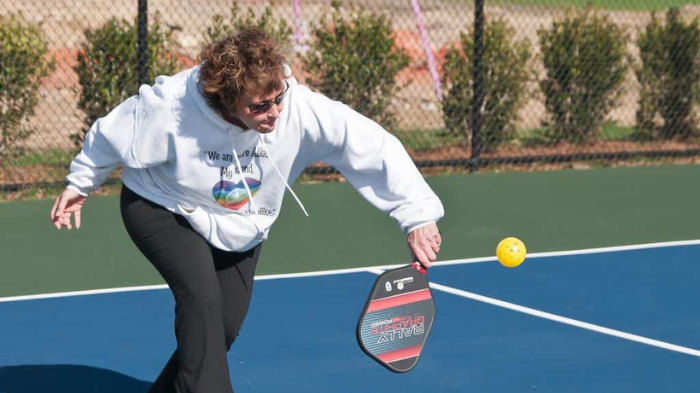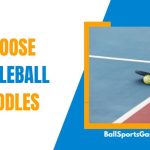Are you looking for enhancing your pickleball playing skills by practicing the game alone? If yes, then you are at the right place. In this blog post, we are going to explain how to practice pickleball alone with some tips and drills for practicing pickleball alone.

Irrespective of whether you’re a beginner or an experienced player, these tips and drills are designed to help you make the most of your practice sessions and enhance your gameplay. We are also going to delve into the reasons for considering practicing pickleball alone. Let’s explore the world of solo pickleball practice and unlock your true potential.
Why You Should Practice Pickleball Alone?
Practicing pickleball alone offers numerous benefits that can significantly impact your game. Here are a few reasons why you should consider practicing pickleball alone:
Focus On Individual Skills: When practicing alone, you can concentrate solely on your individual performance. This allows you to identify and work on specific areas that needs improvement, such as your footwork, technique, or shot placement. By eliminating the distractions of playing with a partner, you can dedicate more time and attention to honing your individual skills.
Flexibility And Convenience: One of the advantages of practicing alone is the flexibility it provides. You can practice whenever and wherever you want without relying on someone else’s schedule. This convenience allows you to fit in practice sessions that align with your availability and preferences. Whether it’s early morning or late evening, you have the freedom to practice at your own pace.
Self-Discipline And Motivation: Practicing alone requires self-discipline and motivation. Without a partner to rely on, you are solely responsible for pushing yourself and staying committed to your practice routine. This self-motivation fosters personal growth as a player and helps to build mental resilience, determination, and perseverance.
Targeted Improvement: Solo practice allows you to focus on specific aspects of your game that requires attention. Whether you want to improve your serves, volleys, or shots near the net, practicing alone enables you to target those specific areas. With repetitive practice, you can refine your technique, develop muscle memory, and enhance your overall performance.
Increased Repetition: When practicing with a partner, you often have to share court time and take turns. However, practicing alone gives you the opportunity for increased repetition. You can hit more shots, serve more balls, and engage in repetitive drills that helps to build muscle memory and improve your consistency.
Personal Evaluation: Practicing alone allows for self-assessment. You can observe your own performance, analyze your strengths and weaknesses, and make adjustments accordingly. This self-evaluation is invaluable in identifying areas for improvement and setting realistic goals for your pickleball journey.
Drills for Practicing Pickleball Alone
When it comes to practicing pickleball alone, there are several drills you can incorporate into your routine to improve your skills and enhance your overall gameplay. These drills focus on different aspects of the game and can be adapted to suit players of all levels, from beginners to advanced. Let’s explore some effective drills for practicing pickleball alone:
Wall Hits:
To practice pickleball alone, locate a spacious flat wall. Position yourself at a distance where you can confidently hit the ball against the wall. The objective is to enhance your precision and control when hitting the ball. This exercise fosters consistency, sharpens your reflexes, and refines your ability to place the ball accurately.
Moreover, it enables you to practice a wide range of shots, including forehands, backhands, and volleys. Engaging in this wall practice routine empowers you to refine your skills and elevate your proficiency in the game of pickleball.

Shadow Drills:
During this exercise, imagine a partner positioned on the opposite side of the court, even though they are not physically there. Mentally immerse yourself in a real game and adjust your movements accordingly. Focus on practicing your shots with precise timing, effective footwork, and proper stroke technique.
This exercise is designed to improve your agility, balance, and shot selection skills. You can vary the intensity by adjusting the pace and experimenting with different shot combinations. By incorporating this drill into your routine, you can elevate your overall performance in pickleball.
Serve And Return Practice:
Set up a target area on your side of the court and focus on perfecting your serves and returns. Practice serving to specific spots, varying the speed and spin. Work on consistency and placement. For returns, imagine different types of serves and practice your positioning and shot execution. This drill improves your serve accuracy, return skills, and decision-making under pressure.
Drop Shot Practice:
Set up targets on the other side of the net, such as cones or markers, at different distances and practice executing accurate drop shots. Start with shorter distances and gradually increase the challenge. Focus on soft touch, finesse, and controlling the ball close to the net. This drill enhances your ability to execute delicate shots and adds variety to your gameplay.
Solo Rally:
In this drill, position yourself at the centerline and hit the ball diagonally, alternating between forehand and backhand shots. This exercise is beneficial for enhancing your footwork, coordination, and shot transitions. Practice hitting both cross-court and down-the-line shots while varying the speed and placement of the ball. This drill simulates a rally in a real game and improves your ability to adapt to different shot angles effectively.
Essential Tips to Follow for Practicing Pickleball Alone
Here are some essential tips to follow when practicing pickleball alone:
Warm-Up: Before starting your practice session, it is important to warm up your muscles and joints. Engage in light cardio exercises, dynamic stretches, and gentle movements to prepare your body for the physical demands of pickleball.

Set Specific Goals: Determine what specific skills or areas you want to focus on during your practice session. Setting clear goals helps you to stay focused and track your progress over time. Whether it’s improving your serve, volley technique, or footwork, having a goal in mind will make your practice more purposeful.
Create A Structured Practice Plan: Plan your practice session in advance to make the most of your time. Divide your practice time into different segments, each focusing on a particular skill or aspect of the game. This structure helps to ensure that you cover all necessary areas and provides a sense of direction to your practice.
Utilize Targets And Markers: Incorporate visual targets or markers on the court to improve your accuracy and ball placement. These targets can be cones, markers, or specific areas on the court where you aim to hit the ball. Practicing with targets enhances your focus and helps you to develop consistency in hitting specific spots.
Record And Analyze: Use a smartphone or video recording device to record your practice sessions. Reviewing your footage allows you to analyze your technique, identify areas for improvement, and make necessary adjustments. It provides valuable visual feedback that can help you to refine your strokes and overall performance.
Work On Mental Focus: Solo practice is an opportunity to improve your mental focus and concentration. Practice mindfulness techniques and visualize game situations to enhance your mental resilience and decision-making abilities. Developing a strong mental game will positively impact your overall performance on the court.
Maintain A Positive Mindset: Solo practice sessions can sometimes be challenging, but it is important to maintain a positive mindset. Embrace the opportunity for self-improvement and view any mistakes or setbacks as a part of a learning experience. Stay motivated, stay patient, and celebrate small victories along the way.
Remember, consistency is key. Regularly dedicating time to practice pickleball alone will yield significant improvements in your skills and gameplay. By following these essential tips, you can make the most out of your solo practice sessions and take your pickleball game to new heights.
FAQs
Yes, practicing pickleball alone can be highly effective. It allows you to focus on specific skills, work on individual weaknesses, and develop self-discipline. While playing with a partner offers different benefits, solo practice is an excellent way to improve your game.
Staying motivated during solo practice can be achieved by setting goals, tracking your progress, and embracing the opportunity for self-improvement. You can also vary your practice routine, incorporate challenges, and reward yourself for achieving milestones.
The duration of solo pickleball practice sessions can vary based on your schedule and preferences. Aim for at least 30 minutes to an hour of focused practice, ensuring that you cover different aspects of the game within that time.
Absolutely! Pickleball training aids, such as target nets, ball machines, or rebound boards, can be highly beneficial during solo practice. They can help you to improve your accuracy, consistency, and overall performance.
While it is not necessary to do so, recording your solo practice sessions can provide you with valuable benefits and insights. It allows you to review your technique, identify areas for improvement, and make necessary adjustments. Visual feedback is invaluable in honing your skills.
Conclusion
Practicing pickleball alone is a valuable and rewarding endeavor. It allows you to focus on developing your individual skills, provides flexibility and convenience, builds self-discipline and motivation, enables targeted improvement, increases repetition, and promotes self-evaluation. By following the tips on how to practice pickleball alone and practicing drills helping you in practicing pickleball alone, you can enhance your pickleball playing skills without having a pickleball partner.
Embrace the opportunity for self-improvement and view mistakes as stepping stones toward progress. With dedication, discipline, and a positive mindset, you can unlock your full potential and excel in pickleball. So, pick up your paddle, head to the court, and embrace the art of practicing pickleball alone to elevate your game.



